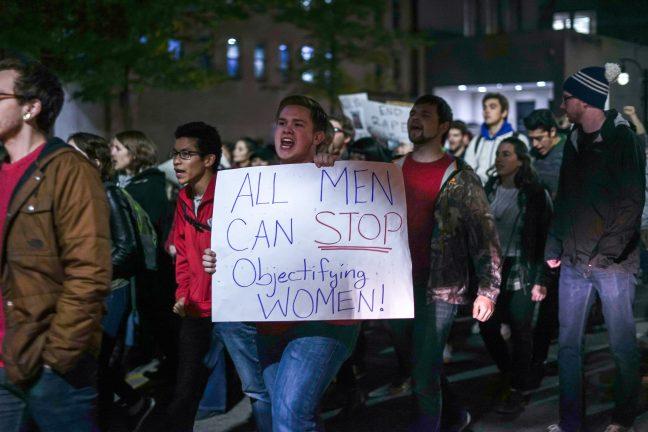As part of a series of events during Sexual Assault Awareness Month, Promoting Awareness and Victim Empowerment welcomed their keynote speaker, feminist writer, Kamillah Willingham to address rape culture and sexual assault prevention and awareness.
Willingham, a graduate of Harvard Law School, contributed to “The Hunting Ground,” a documentary about sexual assault on college campuses. She also helped spearhead a nationally-trending hashtag, “#JustSaySorry,” where sexual assault survivors discussed ways in which their universities failed to investigate their cases.
Rejecting silence: Student survivors take control, speak out on sexual violence
As a survivor of sexual assault herself, Willingham relayed her own personal experiences during her time at Harvard. In 2011, her male friend, a fellow classmate, assaulted her while she was unconscious.
The process of reporting her assault was “one of the hardest things” she had to put herself through.
Overall, she was disappointed with how Harvard handled her situation. Her assailant was allowed back on campus the following year.
How the University of Wisconsin investigates sexual assaults
“Authority figures, such as police and educators, have been socialized to not believe reporters of sexual assault,” Willignham said.
Because of the poor handling of her case, Willingham decided to shift her focus away from corporate law and toward law relating to gender and social equality.
To solve the problem of sexual assault, it is necessary to change the culture first, Willingham said.
“Rape culture is the reason that rape is treated differently than other crimes,” Willingham said. “Telling young women what to do to avoid rape can work, but even if she does everything right, something can still happen.”
Changing culture involves believing women who come forward with reports of sexual assault, respecting the decision of women who choose to remain silent and calling out rape culture whenever one sees it, she said.
One of the biggest changes that needs to be made in ending rape culture, Willingham said, is to veer young men away from the idea that it is “OK to rape.”
“Deciding to ignore rape culture when we see it [only] normalizes it and perpetuates it. It’s on us to call it out and say that it’s not okay,” Willingham said.
Willingham ended her lecture by encouraging the audience to attend Yoni Ki Baat, an event which involves intersectional stories from women of color. The event will run Thursday to Saturday.













